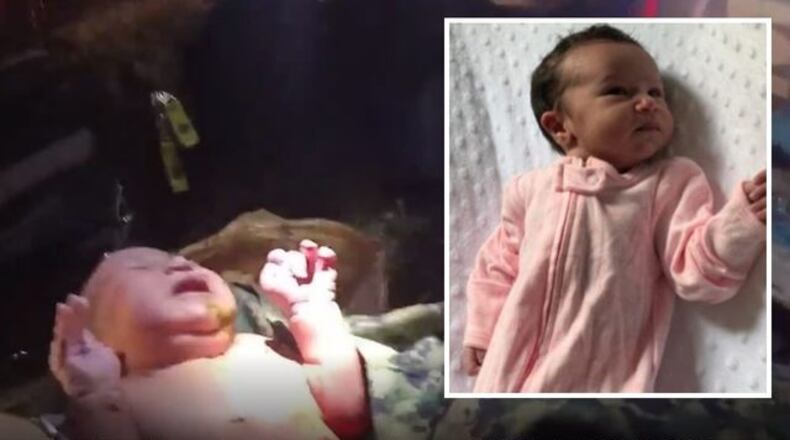After being placed in a plastic bag and left in the woods, a newborn did the only thing she could, and it saved her life.
She cried.
Those cries alerted a Forsyth County family, who dialed 911. This video, released by the Forsyth County Sheriff's Office, shows deputies rescuing the child.
The baby was given the name India, and taken to a nearby hospital. Three weeks later, she is doing well, but the infant’s rescuers still have no idea who her parents are and who abandoned her on an isolated stretch of Daves Creek Road.
“Somebody knows what happened to this child,” homeowner Alan Ragetz told Channel 2 Action News.
A local nonprofit that aims to eliminate infant abandonment wants new or expectant mothers experiencing crisis to know about a safe option.
Since 2002, Georgia has had a Safe Haven law, which allows parents to surrender a baby without facing criminal charges. Two years ago, the law was expanded to give parents up to 30 days from the baby’s birth to give up the child. Georgia’s law is a strong one and provides more options for parents than many states. But those that most need to understand the Safe Haven law may not even know it exists, experts say.
“Sometimes moms don’t know they’re in crisis until they get home,” Emily Virkler, associate director for The Hope Box, told The Atlanta Journal-Constitution.
The Cobb County-based group is the official Safe Haven organization for Georgia. Its leaders were instrumental in expanding Georgia’s law, which originally required a mother to relinquish her baby within seven days.
Another change in the law allows a mother or father to hand over the baby without providing their name as long as the child shows no signs of abuse. The newborn can be left at a hospital, police or fire station. In Georgia, most abandoned babies are placed in the Division of Family and Children’s Services system.
“We found out that we have a lot of cases of incest or sex-trafficking,” Virkler said. “We want to make it easy as possible for a mother to place her baby in a safe place.”
According to the National Safe Haven Alliance, there isn’t a uniform system in place for tracking abandoned babies.
“Nationally it’s an issue as far as reporting,” executive director Heather Burner said.
Since 2014, Georgia’s DFCS system has taken in six babies —including two this year — through the Safe Haven law, according to a department spokesman. The numbers could be slightly higher depending on how case workers classify cases, the spokesman said.
PAST COVERAGE: Police search for mother after baby found in plastic bag
Not all abandoned babies are as lucky as little India. Within the past year, two newborns were found dead, including one left in a cooler and the other placed in a freezer.
In January, the body of a full-term baby was found in a watermelon-design cooler along a Troup County road. A spokesman for the Troup Sheriff's Office said this week investigators had not determined how the baby died or who left the girl behind.
Last summer, a Cobb County woman placed her newborn into a freezer after delivering him at her home. Investigators have not determined whether the baby was stillborn and the mother was later released from jail on bond.
More education is needed throughout Georgia in order to make the Safe Haven law effective, Burner said.
“The Hope Box has been doing training on their own,” she said. “But truly that is something that should be pushed out on the state level. We have to put it back on our legislators and educators. If we don’t do it, than no one is doing it.”
New mothers in crisis may make irrational decisions if not informed of other options, advocates warn. They note that talking about abandoning infants is tough, and spreading the word among immigrant or rural communities can be especially challenging. But women of of all ages and backgrounds should know about the Safe Haven law, Burner said.
“The women we help now, some of them have master’s degrees, some are in their 30s and 40s and have other children,” she said. “It really spans such a wide range of folks. They love their babies. They’re just in a situation where they’re unable to figure out a better way.”
Forsyth County investigators hope someone will call them with information about India. The Sheriff’s Office has set up a tip line at 770-781-3087. Tipsters can remain anonymous.
Until then, India is in state custody and dozens have reached out wanting to adopt her or buy her baby items, according to DFCS.
About the Author
The Latest
Featured



